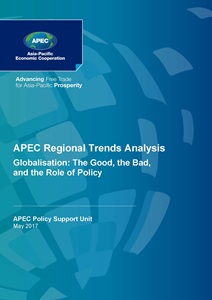APEC Regional Trends Analysis (Globalisation: The Good, The Bad, and the Role of Policy)

| Published Date | May 2017 |
|---|---|
| Type of Publication | Reports |
| Publication Under | APEC Secretariat, APEC Policy Support Unit |
| Accessed | 19549 |
| Pages | 41 |
| Download publication | Download |
Description
This issue of APEC Regional Trends Analysis features two chapters. The theme chapter on “Globalisation: The Good, the Bad, and the Role of Policy” discusses the two sides of globalization and the need for complementary policies to ensure inclusiveness and sustainability in order to maximise the benefits of globalisation.
The next chapter on “Global Economic Momentum and Optimism Fuelling Near-term Growth” examines the recent performance in the APEC region. APEC’s growth continues to be fueled by sustained strength in domestic private and government consumption, with the region expanding by 3.5% in 2016. Trade performance also started to improve in the second half of 2016. As for FDI, APEC economies constituted half of the top 10 FDI recipient economies in 2016, with FDI inflows to those five economies equivalent to 46.7% of global FDI flows. The entry of FDI into the region was facilitated by investment-friendly measures in the period mid-May to mid-October 2016. Trade-facilitating measures also outnumbered trade-restrictive measures during the period.
The next chapter on “Global Economic Momentum and Optimism Fuelling Near-term Growth” examines the recent performance in the APEC region. APEC’s growth continues to be fueled by sustained strength in domestic private and government consumption, with the region expanding by 3.5% in 2016. Trade performance also started to improve in the second half of 2016. As for FDI, APEC economies constituted half of the top 10 FDI recipient economies in 2016, with FDI inflows to those five economies equivalent to 46.7% of global FDI flows. The entry of FDI into the region was facilitated by investment-friendly measures in the period mid-May to mid-October 2016. Trade-facilitating measures also outnumbered trade-restrictive measures during the period.

